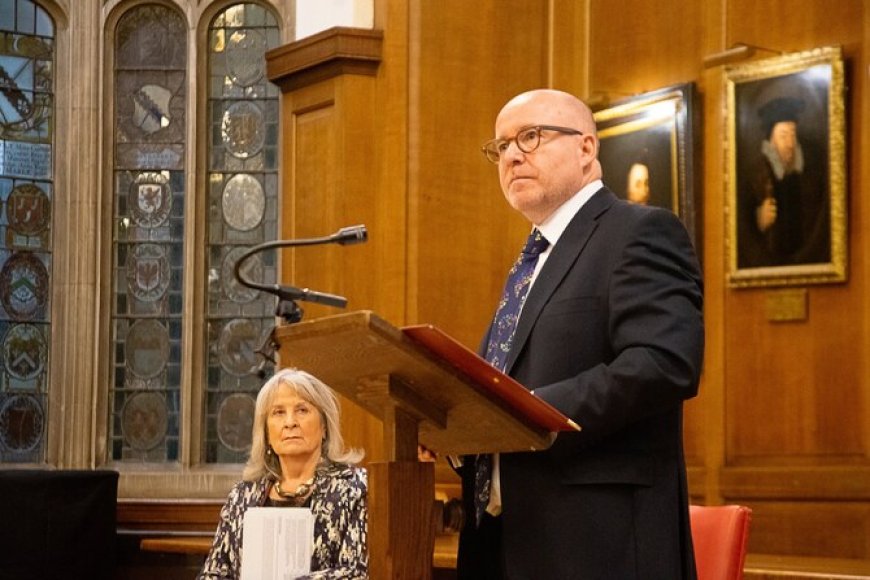UK Legal Adviser Criticizes Israeli Policies, Raises Questions of Accountability
The disclosure that Lord Hermer, the UK Attorney General, signed an open letter that suggested Israeli policies in the Occupied Territories could "amount to apartheid" is a significant development in the political and legal discourse surrounding Israel. The Balfour Project and Lawyers for Palestinian Human Rights collaborated in 2023 to draft a letter that posited that Israeli policies could potentially conform to the legal definition of apartheid. This assertion was founded on the growing international scrutiny of Israeli policies.

The disclosure that Lord Hermer, the UK Attorney General, signed an open letter that suggested Israeli policies in the Occupied Territories could "amount to apartheid" is a significant development in the political and legal discourse surrounding Israel. The Balfour Project and Lawyers for Palestinian Human Rights collaborated in 2023 to draft a letter that posited that Israeli policies could potentially conform to the legal definition of apartheid. This assertion was founded on the growing international scrutiny of Israeli policies.
The government of Prime Minister Benjamin Netanyahu was characterized as "far-right" in a statement signed by a sitting cabinet member. This characterization is indicative of the increasing apprehensions regarding the government's aggressive settlement expansion, judicial upheaval, and the ongoing denial of fundamental rights to Palestinians. The conversation regarding British-Israeli relations was further complicated by the fact that Lord Hermer was one of the few Jewish members of the UK Cabinet, in addition to his role as Attorney General. For this reason, his position was noteworthy.
The letter urged the United Kingdom government to refrain from participating in the International Court of Justice's (ICJ) deliberations regarding the legality of Israeli policies. Although the ICJ refrained from classifying the occupation as apartheid in its July 2024 ruling, it categorically declared the occupation to be unlawful. This result represented a symbolic victory for Palestinian advocates and intensified global calls for accountability.
Lord Hermer's contributions have been substantial in addition to his involvement in the letter. He demonstrated a willingness to challenge Israeli leadership on potential violations of international law by participating in the UK's decision to abandon objections to the International Criminal Court's arrest warrants against Netanyahu and then-Defense Minister Yoav Gallant last July. Additionally, his decision to halt arms sales to Israel in August until a review of international law compliance was conducted indicated a more principled and circumspect stance.
Such overt legal and political challenges have rarely been present in the UK's historical support for Israel, which has been influenced by post-WWII alliances and strategic interests. Nevertheless, the policies of Israel are increasingly being compared to apartheid in light of the mounting evidence of systemic discrimination and the reports of human rights organizations such as Amnesty International and Human Rights Watch. These evaluations concentrate on practices that violate international law, including the continued expansion of settlements, restrictions on movement, and unequal access to resources.
Lord Hermer has been accused by his critics of undermining the UK's longstanding alliance with Israel, while his supporters contend that his stance is indicative of his dedication to human rights and legal integrity. The appointment of Hermer by Prime Minister Keir Starmer may indicate a strategic recalibration, as it reconciles the UK's historical support for Israel with a recognition of the necessity for accountability in accordance with international standards.
Lord Hermer's actions present a challenge to the Western narrative of unwavering support for Israel, particularly in light of the growing body of evidence regarding human rights violations. The UK's propensity to query its policies is indicative of a broader shift in Western political circles, despite the fact that its official stance remains supportive of Israel's right to self-defense. This development is indicative of the increasing dissatisfaction with Israel's far-right government, which has publicly advocated for annexation and exacerbated the divide between Israelis and Palestinians.
Lord Hermer's contributions are a critical moment in the UK's approach to Israeli-Palestinian issues, particularly for advocates of international law and justice. He has facilitated more robust discussions regarding the role of Western nations in perpetuating or challenging systemic inequalities in the region by highlighting legal principles and human rights. It is uncertain whether this represents the commencement of a more extensive realignment in British foreign policy; however, it is undeniably indicative of the increasing conflict between the necessity for accountability and historical alliances.
Lord Hermer's posture may serve as a symbol of the need to reassess long-standing stances on Israel and the Occupied Territories as the clamor for action against apartheid-like systems intensifies. It serves as a reminder that even the most deeply ingrained political norms can and should be contested when justice necessitates it.













































